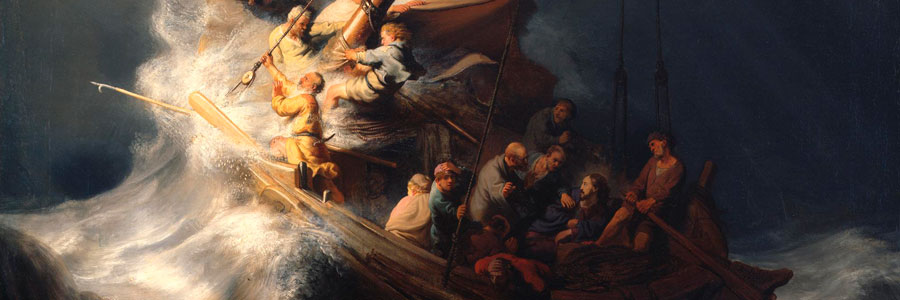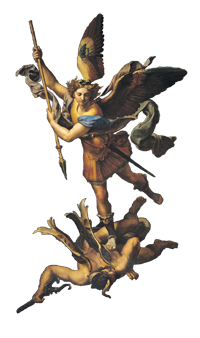Remember What World You Live In

As our present era progresses toward the elevation of “gaslighting” to status as the term of the century, the image of Jesus in Rembrandt’s Christ in the Storm on the Sea of Galilee has repeatedly emerged from the disorder in my mind. The work — stolen from the Isabella Stewart Gardner Museum in Boston in 1990 — depicts a scene that appears in the gospels of Matthew and Mark:
… as evening drew on, he said to them, “Let us cross to the other side.” Leaving the crowd, they took him with them in the boat just as he was. And other boats were with him. A violent squall came up and waves were breaking over the boat, so that it was already filling up. Jesus was in the stern, asleep on a cushion. They woke him and said to him, “Teacher, do you not care that we are perishing?” He woke up, rebuked the wind, and said to the sea, “Quiet! Be still!” The wind ceased and there was great calm. Then he asked them, “Why are you terrified? Do you not yet have faith?” They were filled with great awe and said to one another, “Who then is this whom even the wind and sea obey?” (Mark 4:35-41)
Homilies about this passage tend to put us in the position of the apostles, with the message that we should trust in the power of Jesus during the storms of our lives. While this advice is of perennial application, our times may make it more relevant to put ourselves in the position of Jesus, himself, as our model.
After all, why shouldn’t he be calm? He’s the Son of God, and his time was not yet come during this particular voyage. “Why are you terrified,” he asks the apostles. “Do you not yet have faith?” He might well have asked, “Do you not yet know what world you live in?”
A traveler might sleep on an airplane despite traveling at high speeds at a fatal altitude, because he knows the world is such that airplanes can fly. A patient can sleep before a routine surgery because she knows her civilization has made such practices as safe as can be. Weightlifters revel in their pain because they know it foretells increased strength, and students mightn’t hesitate to throw themselves into the agony of confusion because at the other end lies confident knowledge.
Even more, the believing Christian should know that he or she lives in the world of God’s covenant, in which even death itself is not a terror. This point comes home with another attempted temptation of Christ in the Garden of Gethsemane. Appeals to his pride in the desert at the beginning of his ministry had not worked, but now the whispers appeal to doubt, and this time, Jesus rebukes his apostles for sleeping:
When he returned he found them asleep. He said to Peter, “Simon, are you asleep? Could you not keep watch for one hour? Watch and pray that you may not undergo the test. The spirit is willing, but the flesh is weak” (Mark 14:37)
The gospels do not say, but perhaps Jesus remembered his own preaching: “Do not be afraid of those who kill the body but cannot kill the soul; rather, be afraid of the one who can destroy both the soul and the body” (Matthew 10:28) That is the field on which our battle takes place, and the proof of our victory is our ability to remember what world we live in!
This imperative filters down to our relationship with truth. In a timely essay titled, “On the First Duty of Intelligent People,” Dr. Tod Worner (an internal medicine physician) gives the explanation of his title by means of timeless quotations:
- “We have now sunk to a depth at which the restatement of the obvious is the first duty of intelligent men.” — George Orwell
- “We must always tell what we see. Above all, and this is more difficult, we must always see what we see.” — Charles Péguy
- “What we suffer from to-day is humility in the wrong place. Modesty has moved from the organ of ambition. Modesty has settled upon the organ of conviction; where it was never meant to be. … We are on the road to producing … men too mentally modest to believe in the multiplication table.” — G.K. Chesterton
- “Live not by lies.” — Aleksandr Solzhenitsyn
- “I won’t insult your intelligence by suggesting that you really believe what you just said.” —William F. Buckley
Two modes of thought — strategies of combat — are available in the battle of ideas:
- You must be wrong because I am right.
- I will strive to understand what you are saying as if it might be true so as to fairly assess who is right and who is wrong.
Note that both are distinct from the acknowledgement of objective facts encouraged in the great quotations above.
Gaslighting has become such a powerful force in the twenty-first century because its practitioners present themselves as if they adhere to the second approach, but they are adherents of the first. So persistent are they that their “I am right” engulfs the obvious reality that sits between the disputants. That is the trap.
Yet, we must always question ourselves, so as to balance between the temptation toward doubt (wherein we refuse to acknowledge that truth exists) and the temptation toward arrogance (wherein we refuse to acknowledge that truth exists outside of ourselves). And the only sure way to keep that balance is to root ourselves in the single fundamental truth. As Worner quotes Pope Benedict XVI: “a mature adult faith is deeply rooted in friendship with Christ … that opens us up to all that is good and gives us a criterion by which to distinguish the true from the false, and deceit from truth.”
Remembering what world we live in means being capable of acknowledging error without risking the loss of Truth. The deceiver requires that the facts be seen in the way that points toward an end that he or she desires for some other reason; if the person is a self-deceiver, he or she will not even recognize that this other reason is separate from the facts. The believer strives to understand the facts in order to improve his or her relationship with Truth, which he or she recognizes to ultimately transcend material facts. The facts don’t have to be made to conform with reality, because they implicitly emit from it. That transcendent reality is the world we live in, and remembering it means having the courage to face the storm that plainly speaking the truth can raise in turbulent times because we are not truly at risk of perishing — at least in the sense that matters.


